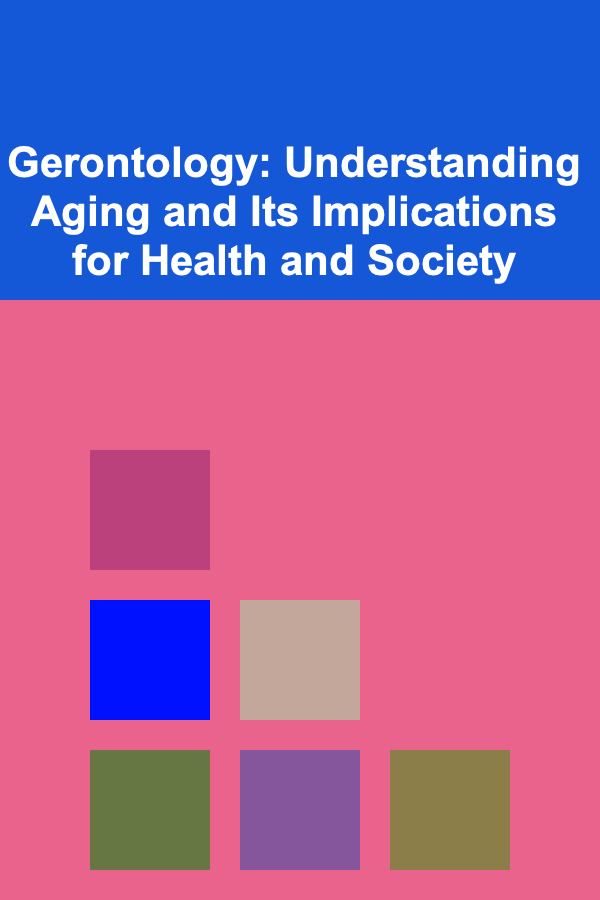
Gerontology: Understanding Aging and Its Implications for Health and Society
ebook include PDF & Audio bundle (Micro Guide)
$12.99$10.99
Limited Time Offer! Order within the next:

Aging is an inevitable part of life, and with increasing life expectancy worldwide, understanding the process of aging and its implications for health and society has become more critical than ever. Gerontology, the multidisciplinary study of aging, explores not just the biological, psychological, and social processes involved in aging, but also how these processes impact individuals and communities at large. In this article, we will delve into the various facets of gerontology, the challenges associated with aging, and the implications for healthcare systems and society as a whole.
The Biological Process of Aging
Aging is a complex process that affects the body at every level, from the molecular and cellular levels to the organ systems and entire body. While there is no single cause of aging, multiple biological theories attempt to explain it, and each offers insights into how the body ages and why it becomes more susceptible to diseases over time.
1. Cellular Aging and Telomeres
At the cellular level, one of the most well-known processes that contribute to aging is the shortening of telomeres, the protective caps at the end of chromosomes. Each time a cell divides, telomeres shorten, which eventually leads to cell death or senescence (when a cell stops dividing). This process is linked to a variety of age-related conditions, including heart disease, cancer, and Alzheimer's disease. Telomere shortening is seen as a marker of biological aging, and researchers are actively investigating ways to slow this process through lifestyle changes, genetic modification, and pharmaceutical interventions.
2. Mitochondrial Dysfunction
Another biological factor contributing to aging is mitochondrial dysfunction. Mitochondria are the powerhouses of the cell, responsible for producing energy in the form of ATP. As we age, the efficiency of mitochondria decreases, leading to reduced energy production, accumulation of reactive oxygen species (ROS), and oxidative stress. This damage contributes to the aging of tissues and organs, particularly in tissues with high energy demands like muscles and the brain.
3. The Role of DNA Damage
Over time, DNA damage accumulates in our cells. This damage, whether from environmental factors like UV radiation or from normal metabolic processes, can lead to mutations. Accumulated DNA damage has been implicated in a wide range of age-related diseases, such as cancer, neurodegeneration, and cardiovascular disease. The body's ability to repair DNA diminishes with age, leading to a greater risk of disease and a decline in cellular function.
4. Hormonal Changes
Aging also brings about significant changes in hormonal levels. For example, levels of estrogen and testosterone decline, leading to menopause in women and a decrease in libido and muscle mass in men. Similarly, changes in insulin and growth hormones contribute to conditions like diabetes and muscle atrophy. The decline in hormones affects not only physical health but also mood and mental health, with an increased risk of depression and cognitive decline.
The Psychological Impact of Aging
Aging affects not only the body but also the mind. The psychological effects of aging can significantly influence an individual's quality of life, and these effects often have wider societal implications. Understanding these psychological changes and their potential consequences is crucial for developing strategies to support elderly individuals in maintaining mental well-being.
1. Cognitive Decline and Dementia
One of the most well-known and feared aspects of aging is cognitive decline, which can manifest as mild forgetfulness or more severe forms of dementia, including Alzheimer's disease. As people age, their brains undergo structural and functional changes, such as a decrease in the size of the hippocampus (important for memory) and the buildup of abnormal protein deposits in the brain. Dementia is a significant concern, not only for the individuals affected but also for their families and caregivers.
The impact of cognitive decline on society is vast, as it leads to increased healthcare costs, the need for caregiving, and loss of productivity. Prevention and management of cognitive decline are major areas of research, with an emphasis on improving mental stimulation, physical activity, and nutrition as key factors in delaying the onset of dementia.
2. Depression and Mental Health
Depression is another common psychological issue faced by older adults. Often, depression in the elderly is underdiagnosed because symptoms may be attributed to the aging process, such as changes in sleep patterns or low energy. Factors like isolation, loss of loved ones, chronic illness, and financial insecurity can contribute to feelings of sadness and hopelessness. It is important for healthcare providers to recognize these signs and provide appropriate treatment, whether through therapy, medication, or social support.
3. Social Isolation and Loneliness
Social isolation and loneliness are increasingly recognized as significant psychological issues for older adults. With the loss of family members, retirement, or physical health challenges that limit mobility, many elderly people face social isolation. Studies have shown that chronic loneliness can have detrimental effects on both mental and physical health, contributing to higher rates of mortality, cardiovascular disease, and cognitive decline. Combatting loneliness by promoting social engagement, community involvement, and strong family ties is critical for improving quality of life in older adults.
The Societal Implications of Aging
As populations around the world age, the societal implications of an aging population are becoming more pronounced. These implications affect various sectors, including healthcare, the economy, and social systems.
1. The Aging Population and Healthcare Systems
One of the most significant challenges of an aging population is the strain it places on healthcare systems. Older adults typically have more complex healthcare needs due to chronic conditions, age-related diseases, and a higher need for long-term care. In many countries, the aging population is growing faster than the workforce, leading to a shortage of healthcare professionals and an increasing demand for care.
To address these challenges, healthcare systems must adapt by integrating geriatric care into mainstream healthcare, training healthcare providers in aging-related issues, and developing long-term care options that are both affordable and accessible. Additionally, promoting healthy aging through preventive measures, such as regular exercise, balanced nutrition, and mental health support, is essential for reducing the burden on healthcare systems.
2. Economic Impacts of Aging
The aging population also has significant economic implications. With fewer people working and more people retiring, there is a growing demand for social safety nets, such as pensions, social security, and healthcare benefits. This places pressure on government budgets, especially in countries with public pension systems. At the same time, there is a decrease in the workforce, which can slow economic growth and productivity.
To address these challenges, governments are looking at solutions such as increasing the retirement age, incentivizing older individuals to remain in the workforce, and exploring policies that support caregivers. There is also an increasing recognition of the importance of aging-in-place, allowing older individuals to live independently for longer through modifications in housing and technology.
3. The Role of Technology in Aging
Technology plays a crucial role in addressing the needs of an aging population. Innovations in healthcare, such as telemedicine, remote monitoring, and robotic caregivers, can improve access to healthcare services and assist with daily living tasks. Assistive technologies, like mobility aids and voice-activated devices, can help older individuals maintain independence and quality of life.
Additionally, technology can help combat social isolation by enabling virtual social connections through video calls, online communities, and digital entertainment. The rise of smart homes, equipped with sensors and automated systems, is another way technology is transforming the lives of older adults, making it easier to live independently and safely.
Conclusion
Gerontology is an essential field that offers deep insights into the aging process, its biological and psychological impacts, and the societal challenges and opportunities that arise as populations age. As life expectancy continues to rise globally, understanding and addressing the implications of aging is critical for ensuring that older adults can live healthy, fulfilling lives. By embracing the insights from gerontology and adopting policies and practices that support the elderly, we can build a society that values and cares for individuals at all stages of life.
The future of aging presents both challenges and opportunities. By preparing for these changes and investing in research, healthcare, and technology, we can create a world where aging is not feared but embraced as a natural part of the human experience.

How to Build Long-Term Client Relationships in Health and Nutrition Consulting
Read More
How To Create Explainer Videos with Animation
Read More
How to Handle Moving Insurance and Claims
Read More
How to Organize Your Closet for Maximum Space
Read More
How to Reduce Your Monthly Bills and Save More
Read More
Monetizing Deep Learning: Create AI Products That Sell
Read MoreOther Products

How to Build Long-Term Client Relationships in Health and Nutrition Consulting
Read More
How To Create Explainer Videos with Animation
Read More
How to Handle Moving Insurance and Claims
Read More
How to Organize Your Closet for Maximum Space
Read More
How to Reduce Your Monthly Bills and Save More
Read More